Early Life And Education
Allama Iqbal was born on November 9, 1877, in Sialkot, a megacity in the Punjab region of British India, which is now in Pakistan. He belonged to a family of modest means and entered his early education in Sialkot. His academic prowess came apparent at a youthful age, and he soon moved to Lahore for advanced education. Iqbal’s trip in academia was marked by his excellence in Persian and Arabic literature. He continued his studies in Europe, carrying a Ph.D. in gospel from the University of Munich, Germany.
Philosophical Elaboration
Iqbal’s exposure to Western gospel and his profound understanding of Islamic study led him to embark on a philosophical trip. He fused rudiments of Eastern and Western gospel to articulate his vision for the reanimation of Islamic culture and church. Iqbal’s poetry and prose reflect a deep concern for the Muslim world’s decline and a hot desire for its reawakening.
Poetry As A Medium Of Expression
Allama Iqbal was a fat minstrel who composed his verses in both Urdu and Persian. His poetry, characterized by its profound philosophical and spiritual content, resonates with compendiums across artistic and verbal boundaries. Some of his most notable workshop include” Bang-e-Dra,”” Asrar-e-Khudi,” and” Payam-e-Mashriq.” In these workshop, he explored themes of individuality, tone- mindfulness, and the significance of church.
Concept Of Khudi
The conception of” Khudi”( identity) is central to Iqbal’s gospel. He believed in the commission of the existent through tone- mindfulness and tone- consummation. He encouraged people to fete their implicit and take charge of their fates. For Iqbal, Khudi was the key to particular and collaborative growth.


Allama Iqbal The Poet of the East
Political Vision
Allama Iqbal’s influence extended beyond the erudite world. He played a vital part in inspiring the Muslim community of the Indian key to demand their rights and eventually led to the creation of Pakistan in 1947. His notorious Allahabad Address in 1930 is considered a corner in the trip towards Pakistan’s independence. In his address, he articulated his vision of a separate motherland for Muslims.
Heritage And Influence
Allama Iqbal’s impact on the artistic, political, and intellectual history of the key is profound. His poetry continues to inspire millions of people, and his gospel of tone- discovery and tone- determination remains applicable in contemporary times. His birth anniversary is celebrated as Iqbal Day in Pakistan, and his verses are frequently recited and bandied in erudite circles.
Conclusion
Allama Iqbal,” The Poet of the East,” wasn’t simply a minstrel but a champion, thinker, and visionary who sought to enkindle the honey of tone- mindfulness and tone- determination among his people. His erudite benefactions, coupled with his political vision, played a pivotal part in the creation of Pakistan. Allama Iqbal’s enduring heritage serves as a memorial of the power of words, ideas, and the determination to bring about meaningful change in society. His poetry and gospel continue to inspire individualities in their hunt for tone- discovery and the pursuit of a better future.

